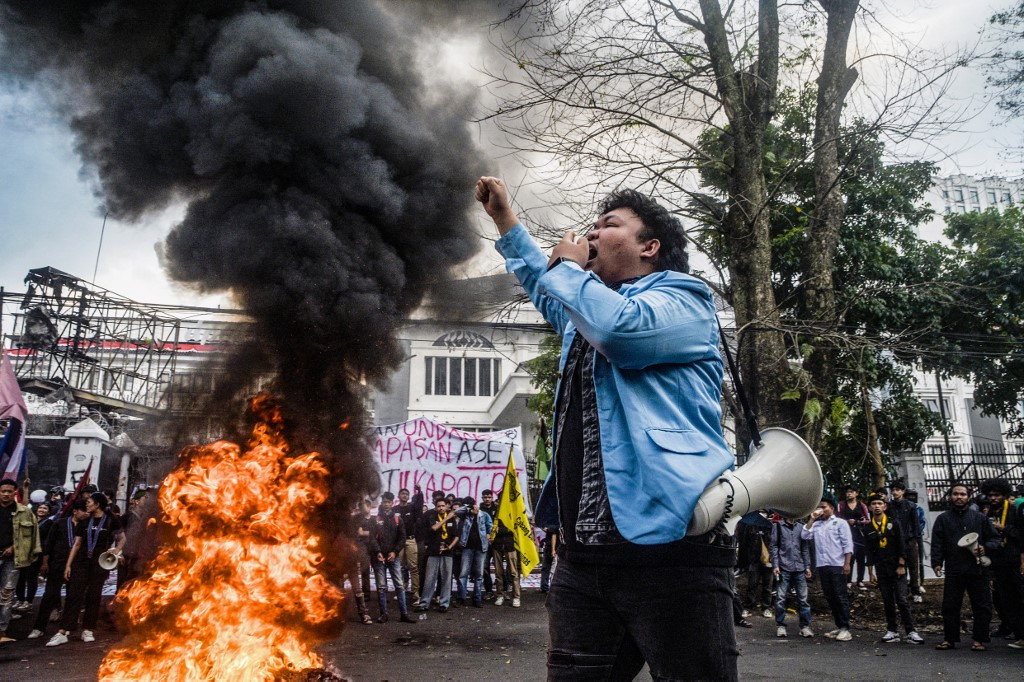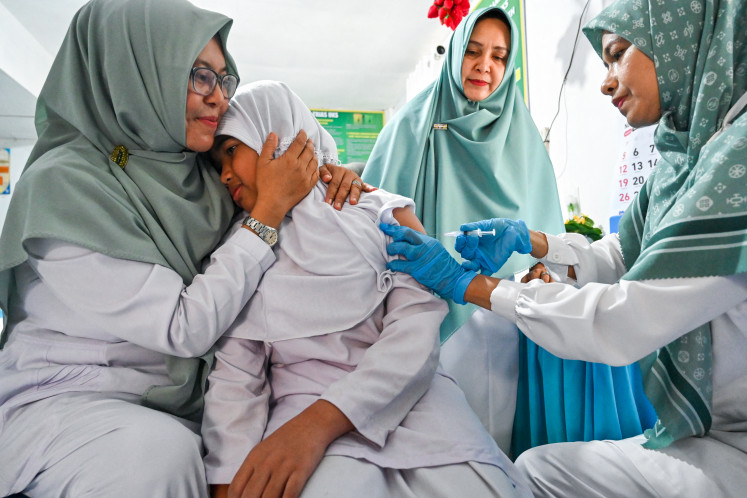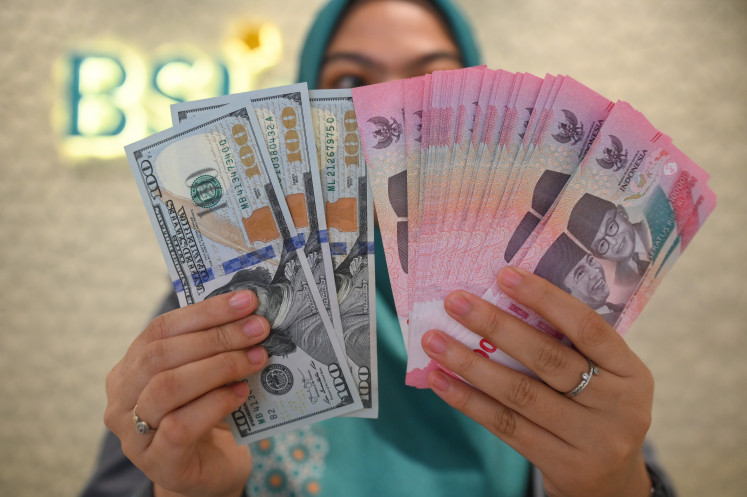Popular Reads
Top Results
Can't find what you're looking for?
View all search resultsPopular Reads
Top Results
Can't find what you're looking for?
View all search resultsWhat’s behind the rioting? And will the much-loathed political elite back down?
The recent protests have evoked memories of the 1998 Jakarta riots, but it remains to be seen how underlying interests related to the police-military rivalry and the oligarchic elite will play out against the demonstrators' anger over genuine socioeconomic and political concerns.
Change text size
Gift Premium Articles
to Anyone
F
or many Indonesians, the violent riots recently wracking Jakarta and other cities across the archipelago are eerily reminiscent of the riots of 1998 that accompanied the fall of former dictator Soeharto and his New Order regime after three decades in power.
As in 1998, demonstrators have targeted the legislative complex and “fat-cat” politicians they see as neglecting and even impoverishing them. Rioters are also vandalizing the homes of politicians and stripping them of luxury goods.
Also striking is the behavior of the security forces. While there are widespread reports of police violence, some members of the military are said to have been standing by, not stopping the looting. In one case, they even handed out drinks and cash to rioters.
Again, this reminds many of the involvement of the military in the 1998 riots, when soldiers cracked down harshly on protesters but were also accused of facilitating rioting and looting. Prabowo Subianto, then a senior army general, was dismissed after being allegedly implicated in these events, particularly in the forced disappearances of democracy activists.
The situation in Jakarta is not yet as serious as it was in 1998, but the presence of thousands of violent rioters targeting the rich and powerful is still a nightmare for the country’s oligarchic elite. Mass protests are one of the few things that give them pause, and sometimes even force them to back down.
This is why these protests can also be vulnerable to manipulation by members of that same elite: They hope to weaponize public fury against each other.
But there is much more to these events than just elite rivalry.
In recent years, huge protests calling on legislators to abandon plans to pass a repressive new Criminal Code or gut the once-respected Corruption Eradication Commission (KPK) have failed. But this has only added to a backlog of grievances against politicians.
On Independence Day on Aug. 17, some protesters even flew One Piece pirate flags below the national flag. Officials called this act “treason”.
The recent street protests began spontaneously a week later on Aug. 25, with people calling for the dissolution of the House of Representatives. Protesters were enraged that legislators had granted themselves lavish new monthly housing allowances of Rp 50 million (US$3,034), which the deputy speaker claimed was still not enough, even though many politicians already earn more than $5,000 per month (and some more than $13,000), tax-free.
The angry public response was understandable, given the minimum wage in Jakarta is just $350 per month. There is deep resentment in Indonesia of politicians, who are seen as corrupt, lazy and out of touch.
The growing budget hole created by President Prabowo’s costly signature projects means many basic social services have been slashed since he was sworn in last October, including health, education and local government funding. The ranks of the poor are growing, and the middle class is shrinking. Both segments of society are hurting.
Unsurprisingly, demonstrators demanded the legislators’ new housing allowances be canceled, along with other perks. Lawmakers responded arrogantly, with one even calling the protesters “the dumbest people in the world”.
The demonstrations were relatively calm at first. Then on Aug. 28, Affan Kurniawan, a 21-year-old ojol (online motorcycle transportation) driver who happened to be making a delivery near the protests, was run over and killed by a police vehicle.
The symbolism could hardly be starker: a precarious gig worker, struggling to support his parents on a pittance, crushed by an armored vehicle driven by the police, popularly seen as corrupt and oppressive agents of the political elite. It seemed to encapsulate the issue at the heart of the demonstrations: elite greed and lack of concern for the “little people” (orang kecil).
Associations of ojol (online motorcycle transportation) drivers and many other community groups quickly organized, demanding the police be held accountable. The protests then grew outside the Jakarta Police headquarters and spread rapidly across the country. Rioters targeted police stations, government buildings and bus and train stations.
Looting and even arson attacks followed, resulting in the destruction of numerous regional legislatures. There have been at least eight deaths so far.
Prabowo now says he is listening to protesters’ grievances and the House will cancel the legislators’ allowances. It remains to be seen if that ever happens and whether it will last, given it’s in his interests to keep lawmakers’ pockets full.
Reflecting his military past and “strongman” self-image, the President has also said the protesters are committing treason and terrorism. He has called on police to act against them with “determination”.
These events are clearly a threat to some members of the elite, but there is no doubt they offer opportunities to others.
Some protesters believe the different responses of the police and the army – long-standing rivals for status, funds and influence – reflect their competing political allegiances.
Prabowo, a former commander of the Army’s Special Forces (Kopassus), is said to be backed by the army, while National Police chief Gen. Listyo Sigit Prabowo is loyal to former president Joko “Jokowi” Widodo, who appointed him. Jokowi also presided over huge growth in police budgets and numbers while in office.
While Prabowo won last year’s presidential election thanks to an alliance he formed with Jokowi, the two now seem locked in a struggle for power.
Some critics suggest it would suit Prabowo for the police to be the villains in the current protests, as that would weaken Jokowi. Army inaction (or even provocation or support for the rioting) helps achieve that. The ultimate aim, they suggest, might even be to disband the National Police and make it a subordinate branch of the military, as it was under Soeharto.
In 1998, Prabowo was allegedly involved in manipulating the rioting in Jakarta in a failed effort to win power. Many Indonesians believe a similar high-stakes scheme today is not beyond him.
Whether or not this is true, conspiracy theories are running wild. It’s certainly possible the elite would try to meddle in events in the streets, even if details are likely to remain murky.
But it’s equally apparent the protests are a genuine outburst of long-simmering grievances against the political elite, guided by grassroots civil society organizations. Unfortunately, these groups have not yet been able to articulate the clear set of political demands that could create a more unified movement out of the street protests, as happened in 1998.
Will the elite back down? They did in 1998. Then, the rioting forced the New Order elite to purge themselves of their more toxic members (such as Soeharto and for a while Prabowo, who was then his son-in-law) and reconfigure as nominal Reformasi (reform movement) democrats.
But that does not look likely this time; at least, not yet. Although Indonesia has been a constitutional democracy since 1999, real political authority is still firmly in the hands of a relatively small, entrenched oligarchic elite.
They have learned to win elections and control the political process so effectively there is no meaningful political party opposition at all. This has created an increasingly undemocratic ruling coalition that has its own savage internal fights (such as those between Jokowi and Prabowo), but has proved extraordinarily resilient and resistant to external pressure.
While many rich and powerful oligarchs fear Prabowo’s innate authoritarianism, the current crisis is probably not enough to force a split with him.
Indeed, Prabowo might even be able to use his response to the riots to further consolidate his power. Some suggest he might even impose martial law if they continue.
And this means that once the unrest dies down (and that may take a while) and Prabowo and his inner circle feel sufficiently in control again, a harsh crackdown on civil society critics and protest leaders is a very real possibility.
---
The writer is Malcolm Smith Professor of Asian Law and director of the Centre for Indonesian Law, Islam and Society at The University of Melbourne. This article is republished under a Creative Commons license.











